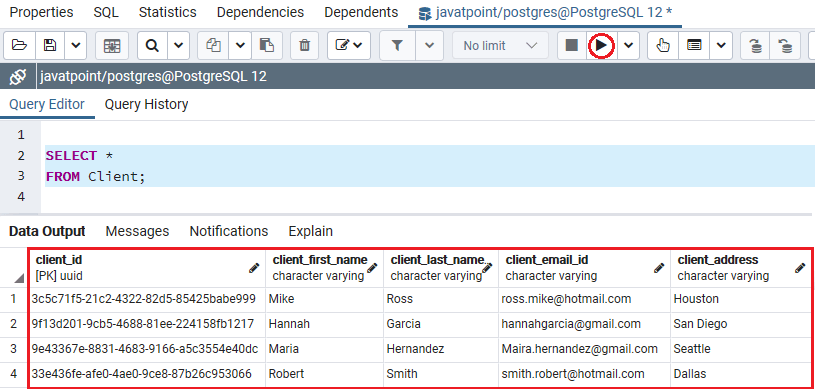
- #Uuid generator command line how to#
- #Uuid generator command line mac os#
- #Uuid generator command line code#
This error occurs in environments where the standard crypto.getRandomValues() API is not supported. Methods for the other algorithms ( uuidv1(), uuidv3() and uuidv5()) are available from the files, and respectively.

These CDNs all provide the same uuidv4() method: To load this module directly into older browsers you can use the UMD (Universal Module Definition) builds from any of the following CDNs: Step 2 : pdmperl -e 'print PDM::GetUUIDValue ' Step 3 : Which will generate uuid on the command prompt. I’m sure that some people will complain that it’s not as random as some of the other options, but honestly, it’s random enough if you’re going to be using the whole thing.
#Uuid generator command line mac os#
Instructions: Step 1 : Open a command prompt, execute following command. And here’s the easiest way to make a password from the command line, which works in Linux, Windows with Cygwin, and probably Mac OS X.
#Uuid generator command line how to#
To load this module directly into modern browsers that support loading ECMAScript Modules you can make use of jspm: Ĭonsole.log(uuidv4()) // ⇨ '1b9d6bcd-bbfd-4b2d-9b5d-ab8dfbbd4bed' How to generate UUID using command prompt Background: Command to generate UUID from command prompt. To run the examples you must first create a dist build of this library in the module root: npm run build Create a UUID (ES6 module syntax) import from 'uuid'
#Uuid generator command line code#
Upgrading from Your code is probably okay, but check out Upgrading From for details.
CLI - Includes the uuid command line utility. Small - Zero-dependency, small footprint, plays nice with "tree shaking" packagers. Secure - Cryptographically-strong random values. Chrome, Safari, Firefox, Edge, IE 11 browsers. CommonJS, ECMAScript Modules and CDN builds. Complete - Support for RFC4122 version 1, 3, 4, and 5 UUIDs. More than one of these libraries might be available on a particular machine, so configure does not automatically choose one. When invoking configure, specify -with-uuid=bsd to use the BSD functions, or -with-uuid=e2fs to use e2fsprogs' libuuid, or -with-uuid=ossp to use the OSSP UUID library. On Linux, macOS, and some other platforms, suitable functions are provided in the libuuid library, which originally came from the e2fsprogs project (though on modern Linux it is considered part of util-linux-ng). On FreeBSD, NetBSD, and some other BSD-derived platforms, suitable UUID creation functions are included in the core libc library. The following SQL commands are used to find all available extensions. uuid-ossp can now be built without the OSSP library on some platforms. In this article, youll learn about Postgres UUIDs and how to generate them with. While the OSSP UUID library can still be found at, it is not well maintained, and is becoming increasingly difficult to port to newer platforms. Historically this module depended on the OSSP UUID library, which accounts for the module's name. Version 5 should be preferred over version 3 because SHA-1 is thought to be more secure than MD5. Generates a version 5 UUID, which works like a version 3 UUID except that SHA-1 is used as a hashing method. Uuid_generate_v5 ( namespace uuid, name text ) → uuid Generates a version 4 UUID, which is derived entirely from random numbers. The generation of UUIDs by this method has no random or environment-dependent element and is therefore reproducible. The name parameter will be MD5-hashed, so the cleartext cannot be derived from the generated UUID. The output from line 5 will be something. On line 5, we use Python's function, str, to convert from the UUID object to a string. This is an instance of Python's UUID class, not a string. On line 3, we generate a new Version 4 UUID using the uuid module and store it in the variable, myuuid. SELECT uuid_generate_v3(uuid_ns_url(), '') On line 1, we import Python's built-in uuid module. (It could be any UUID in theory.) The name is an identifier in the selected namespace. The namespace should be one of the special constants produced by the uuid_ns_*() functions shown in Table F.34. Generates a version 3 UUID in the given namespace using the specified input name. Uuid_generate_v3 ( namespace uuid, name text ) → uuid Generates a version 1 UUID, but uses a random multicast MAC address instead of the real MAC address of the computer. 
Note that UUIDs of this kind reveal the identity of the computer that created the identifier and the time at which it did so, which might make it unsuitable for certain security-sensitive applications. Logger, This is the simple logging interface used by JUG package.

This involves the MAC address of the computer and a time stamp. Simple command-line interface to UUID generation functionality.







 0 kommentar(er)
0 kommentar(er)
